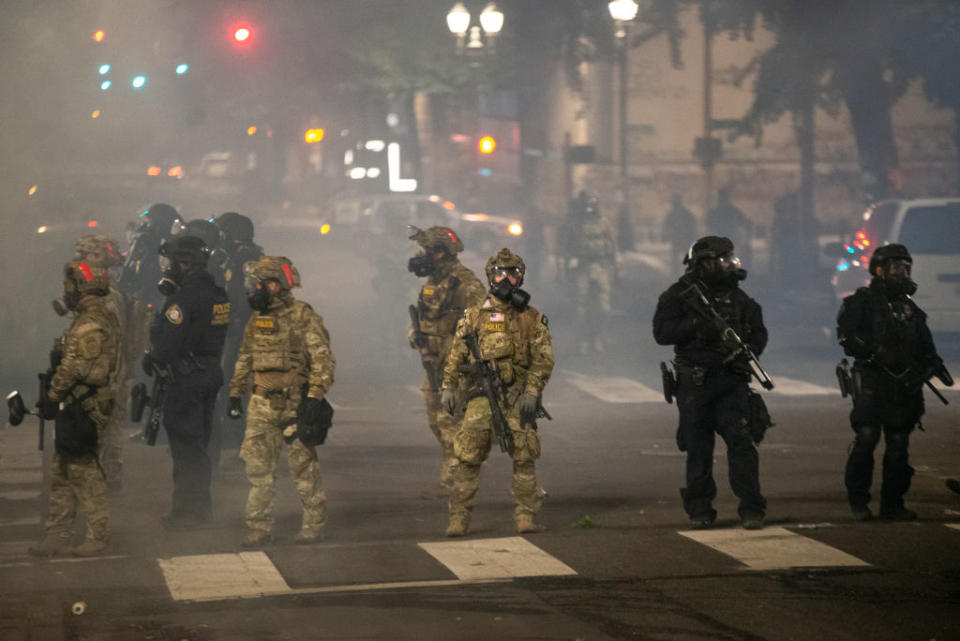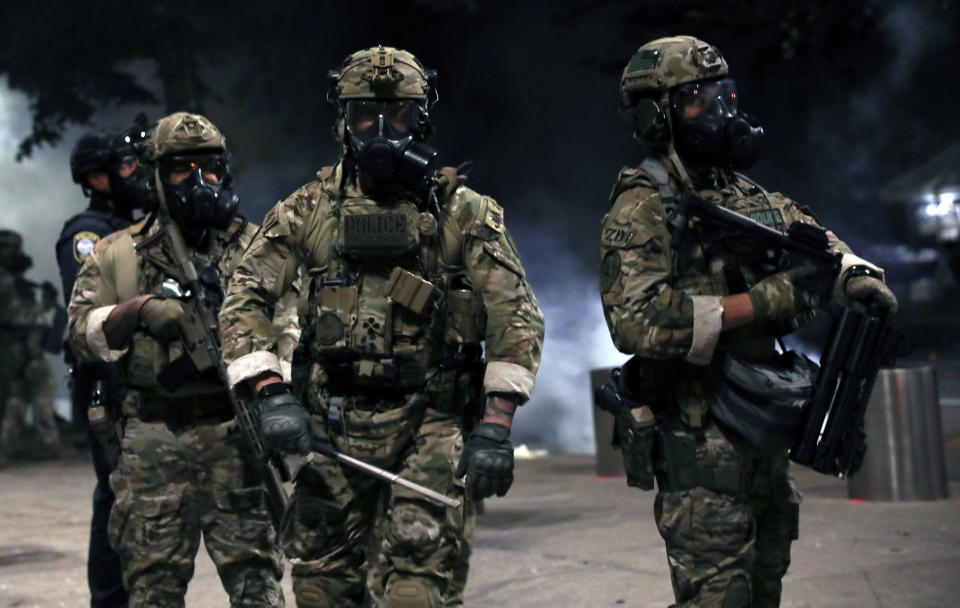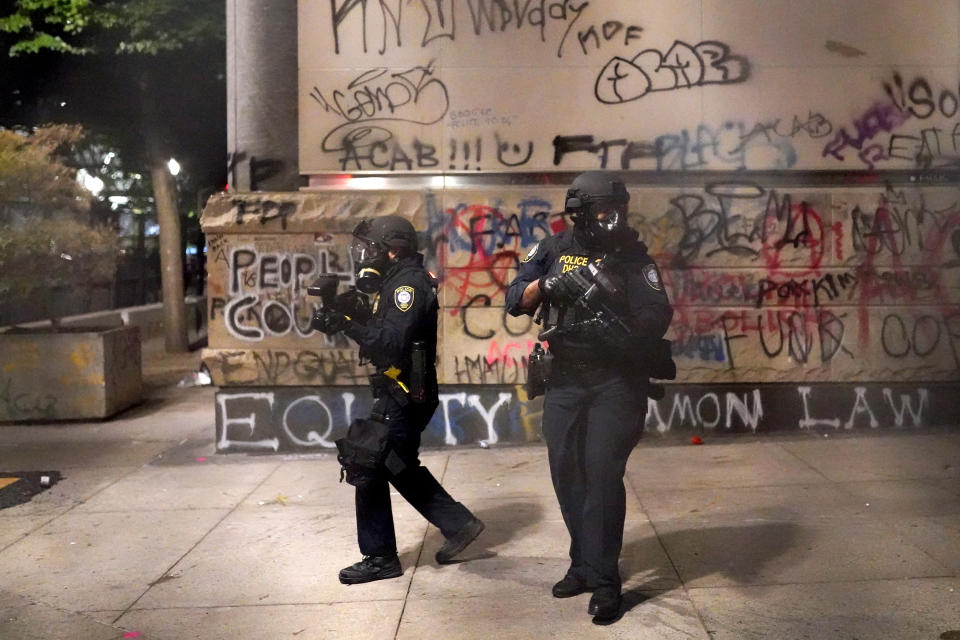Portland arrests put low-profile Federal Protective Service in the spotlight
The Federal Protective Service, a small and relatively obscure part of the government charged with securing federal buildings, has suddenly emerged into the spotlight as the lead agency in the crackdown on the nightly demonstrations in Portland, Ore.
Department of Justice Inspector General Michael E. Horowitz announced Thursday that, acting on a referral from the U.S. attorney for Oregon, he had opened an investigation into allegations of possible improper use of force involving DOJ law enforcement personnel in Portland. It’s unclear whether those personnel were from the U.S. Marshals Service, which is charged with protecting courts, or another agency. Horowitz also announced an examination of DOJ’s role responding to recent civil unrest in Washington’s Lafayette Square last month.

Most of the federal law enforcement officers in the Portland operation are “detailees” to the Federal Protective Service from other agencies within the Department of Homeland Security, according to Stewart Baker, who was DHS Assistant Secretary for Policy from 2005 to 2009. Because the Federal Protective Service is a division of less than 1,000 people, many of the agents in Portland are from U.S. Immigration and Customs Enforcement and the Border Patrol, Baker said.
Responsibility for oversight of the FPS has shifted over the years, but it is now run by the Office of Management at the DHS. Baker called FPS “a bit of a stepchild at DHS.”
“Their authorities are basically to protect federal property, especially federal buildings,” Baker said. “While that is usually not a very controversial or exciting authority, it can be deadly serious, as we saw in Oakland."
In May, an FPS officer was killed and a second was injured in a drive-by shooting while guarding a federal building in Oakland during demonstrations against police brutality. Baker said that while he believes the Trump administration has some legal cover for its decision to deploy the FPS, he worries about more violence akin to that seen in Oakland.

Baker said that the Portland Police Department’s struggle to keep order could justify the use of the FPS, although he said it’s unclear if the threat to federal property in Portland was substantial enough to warrant it.
“It’s also very hard to protect a handful of buildings if you don't have support and coordination with the police force for the entire city,” Baker said. “So I do worry that the adversarial nature of the relationship between the federal government and the city and the state is going to make it hard for the DHS force to do their job safely for everybody."
There are also serious legal questions, said Kent Greenfield, a constitutional law expert and professor at Boston College Law School. While one of the president’s fundamental constitutional responsibilities is to "take care that the laws be faithfully executed,” that obligation does not automatically empower the president to override the police power of the states.
“The president is the chief federal law enforcement official, not the chief law enforcement official of all 50 states,” Greenfield said. “The constitutional understanding is that because of federalism, because of states’ rights, the federal government stays in its purview and the states stay in theirs. Obviously there’s going to be overlap and instances in which authority is similar and overlapping. But what’s happening in Portland is not that.”

The Federal Protective Service is charged with securing federal facilities and monuments but “are not empowered to roam widely and engage in general law enforcement. ... You can’t send in federal agents to just willy-nilly enforce state law.”
Greenfield said some exceptions to that limitation exist. He said that during the civil rights movement the federal government was well within its constitutional rights when it stepped in to override local authorities who were obstructing the Supreme Court rulings on desegregation.
“When Eisenhower sent in the 101st Airborne to make sure the Little Rock Nine could get into Central High School in Little Rock, that was completely appropriate because the state governor at that point, Orval Faubus, was thumbing his nose at court orders, thumbing his nose at federal law, was using state troops to ring Central High School prohibiting the desegregation order, and so you had to have federal troops going into enforce the federal law,” Greenfield said. “We’re in a situation in which the states are completely able to enforce the laws on the ground and the only reason that Trump is doing this is because he’s trying to prove his political masculinity.”
Scott R. Anderson, a visiting fellow in governance studies at the Brookings Institution, said the statute that Trump is relying on to deploy the Federal Protective Service was a post-9/11 law written as part of the creation of the Department of Homeland Security. Anderson said there has long been “an idea in case law” that the federal government has an inherent authority to defend its personnel, its facilities and its operations.
But Anderson said that the law creating the Department of Homeland Security in 2002 was written broadly to authorize the secretary of homeland security to defend all federal property. The statute doesn’t limit the extent to which federal officials can operate outside of the actual federal property they’re protecting, except by what Anderson called “this subjective standard, which is that it is limited to the extent necessary to protect the property and persons on the property.”

Anderson said prior administrations would likely not have interpreted the law as broadly as the Trump administration has.
“In Portland, what makes it really exceptional is this is something that state and local authorities have said, ‘We don’t want you doing this,’” said Anderson. “DHS is pursuing activities that may very well be opposed by local law enforcement and it begs dangerous scenarios.”
Anderson said that he believes the suggestion by the district attorney in Philadelphia, that the federal agents are opening themselves up to potential prosecution, is correct. Local jurisdictions would be able to charge the federal agents for violating state law if they are enforcing it “in a case where the link to a federal law is really weak, as frankly it looks like the case is in Portland.”
He said there are also larger constitutional questions in play. The Fourth Amendment to the Constitution protects against unreasonable search and seizure.
“Even if what DHS is doing in Portland were lawfully authorized and were entirely pursuant to enforcing federal law, it’s highly questionable under the Fourth Amendment, which prohibits unlawful searches and seizures, that law enforcement officers can just walk up and detain people,” Anderson said. “Detain them without reading them Miranda rights, and dropping them off at courthouses. That’s the fact pattern that’s been alluded to — that’s unlawful even if there’s a totally legally authorized reason for doing it. That is just not the way you can enforce the law in the United States.”
_____
Read more from Yahoo News:


